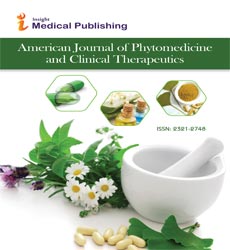ISSN : 2321-2748
American Journal of Phytomedicine and Clinical Therapeutics
The Potential Benefits of Pomegranate as a Natural Supplement for Enhancing Athletic Performance and Recovery
Katarzyna Głowacka*
1Department of Pharmacy, Medical University of Warsaw, Warsaw, Poland
- *Corresponding Author:
- Katarzyna Głowacka
Department of Pharmacy, Medical University of Warsaw, Warsaw, Poland
E-mail: katarzynag@gmail.com
Received date: September 17, 2024, Manuscript No. IPAPCT-24-19901; Editor assigned date: September 20, 2024, PreQC No. IPAPCT-24-19901 (PQ); Reviewed date: October 04, 2024, QC No. IPAPCT-24-19901; Revised date: October 11, 2024, Manuscript No IPAPCT-24-19901 (R); Published date: October 18, 2024, DOI: 10.36648/2321-2748.12.3.299
Citation: Glowacka K (2024) Analyzing the Potential of Pomegranate as a Natural Supplement for Boosting Athletic Performance and Recovery. Am J Phytomed Clin Ther Vol.12 No.3: 299.
Description
Celebrated for its rich Middle Eastern cultural background and its abundance of polyphenols, pomegranates have potential as a powerful nutritional supplement. Pomegranate supplements have drawn interest due to its ability to improve general health and reduce physiological stresses, in addition to their historic use. Conflicting study results, however, continue to cast doubt on its effect on exercise performance and recuperation. This extensive study examines how pomegranate supplementation affects a range of physiological markers in athletes, sportsmen, and healthy people. A thorough literature study that followed the Preferred Reporting Items for Systematic reviews and Meta- Analyses (PRISMA) standards spanned several databases and produced 4401 articles. Out of these, 23 studies with 507 participants satisfied the strict inclusion requirements, demonstrating a wide range of pomegranate doses and techniques. According to research, pomegranate supplements may have a major positive impact on exercise performance and health indicators. Aspartate Transaminase (AST), High Density Lipoprotein (HDL), Malondialdehyde (MDA), lactate, Systolic Blood Pressure (SBP) and Diastolic Blood Pressure (DBP) were among the markers that showed significant improvements between the pomegranate and placebo groups, according to a meta-analysis. To get the benefits, the majority of the research recommended consuming 250 milliliters of pomegranate juice every day for at least a week. Notably, improvements in cardiovascular health and antioxidant status suggest possible benefits for exercise-related outcomes, such as quicker muscle recovery, less soreness and increased endurance over extended periods of time. In conclusion, for athletes and sports fans looking to maximize their physical performance and general well-being, pomegranates are a strong natural substitute for synthetic supplements. However, further research is necessary to completely understand its mechanisms and larger-scale studies and standardized techniques are needed to confirm and improve these encouraging results.
Pomegranate supplements
Prehistoric Middle Eastern culture is where the pomegranate, scientifically known as Punica granatum, first appeared. The edible portion of the pomegranate makes up around 52% of its weight, with liquid making up roughly 78% and seeds making up 22%. Whole pomegranate fruits are partially pressed to create this juice. Polyphenols, sugars, fatty acids (conjugated and nonconjugated), aromatic compounds, amino acids, tocopherols, sterols, terpenoids, alkaloids and more are among the many phytochemicals that are abundant in pomegranates. Recent years have seen a tremendous advancement in the manufacture of pomegranate extract in liquid and dry powder forms, offering convenient alternatives to obtaining the healthful polyphenols included in pomegranate juice. Solid-phase extraction is the process of drying and further purifying the resin to create the powdered extract. The leftover fruit material from a second pressing process is used to make the liquid extract. By raising the content of polyphenols, this method improves the powder's efficacy and adaptability. Pomegranate juice and extract supplements, which are rich in polyphenols, have been demonstrated to offer several health benefits. Those who are exhibiting physiological stress, such as cardiovascular illness, oxidative stress, or cellular stress, may benefit from supplementing with pomegranates in particular. Pomegranate supplements may aid in recovery and ergogenic benefits since they appear to be particularly helpful for improving a range of physiological responses in individuals displaying symptoms of physiological stress. Despite the potential for enhanced exercise performance and post-exercise recovery following pomegranate supplementation, there are few and inconsistent studies assessing the advantages of pomegranate supplementation on exercise performance and recovery.
Pomegranate and exercise recovery
Nowadays, it is generally acknowledged that maintaining a healthy lifestyle requires regular exercise, a balanced diet and physical activity. Muscle contractions and an increase in free radicals and byproducts are both caused by moderate and vigorous exercise. Regular, moderate exercise has been shown to help prevent cardiovascular disease, metabolic syndrome, type II diabetes and neurological conditions including Parkinson's and Alzheimer's. Furthermore, this type of exercise maintains physical fitness and health while enhancing overall wellbeing. Regular, moderate exercise can help build stress tolerance and adaptive responses, both of which are critical for preventing degenerative and chronic diseases. Pomegranate supplements may be a more effective treatment than other meals high in polyphenols to improve performance and muscle repair, but additional research is required.

Open Access Journals
- Aquaculture & Veterinary Science
- Chemistry & Chemical Sciences
- Clinical Sciences
- Engineering
- General Science
- Genetics & Molecular Biology
- Health Care & Nursing
- Immunology & Microbiology
- Materials Science
- Mathematics & Physics
- Medical Sciences
- Neurology & Psychiatry
- Oncology & Cancer Science
- Pharmaceutical Sciences
